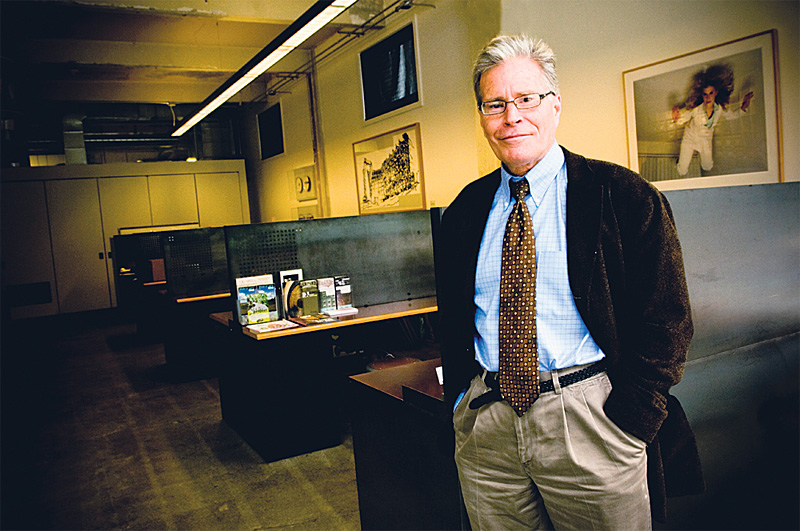He may be a former actor, but Jim Kelly seems to have little need for the limelight. As executive director since 1998 of 4Culture, the cultural-services agency for King County, Kelly probably has more impact on arts and preservation initiatives around here than any other single individual. Yet his name and anchorman-handsome visage remain unknown to most people outside the arts. And no wonder: He’s barely even a character in the stories he tells.
His self-effacing nature thoroughly belies his effectiveness, though, and the high regard in which he’s held by those who know. “Jim is the kind of leader that you pray for in the arts community,” says Jake Groshong, executive director of Balagan Theatre on Capitol Hill, which has received 4Culture grants. “I’m doubtful we’d have something even close to the vibrant arts scene we have if it weren’t for Jim.”
After attending college at Catholic University, Kelly worked construction in New York City while trying to be an actor. Eventually he took a job with the New York City Department of Cultural Affairs, which gave grants to organizations in lower-income neighborhoods. “I started seeing the arts in a new way…through the prism of social benefits,” he recalls. Priced out of the city, he moved to Seattle in 1990 after his daughter was born, working construction again until he found a job with King County running cultural programs. In 1998 he became head of the department that eventually became known as 4Culture.
At the agency’s loft-like office space in the Tashiro Kaplan Building—whose exposed pipes and cracked cement floors evoke the process that the agency so likes to see revealed in art and preservation—Kelly speaks at a rapid clip about 4Culture’s mandates and projects. These range from boosting individual artists with cash awards to helping fund arts groups’ ongoing operating costs to preserving heritage landmarks. Not to mention finding other innovative ways to promote the arts.
For example, when playwright Keri Healey noticed that the floor displays at IKEA looked like the sort of expensive sets her type of fringe theater could never afford, she and Bret Fetzer wrote some scenes that could be performed there. Kelly accompanied Healey to meetings with IKEA executives, and 13 10-minute plays resulted. Shoppers returned week after week to follow the series in 2005. The project went so well that IKEA hired Healey to create additional pieces for the children’s section and licensed the adult material for a store near Dallas. As the drama franchise grows, Healey will contract the production out to sister theaters in other cities where the stores are located.
“I would never have pushed the idea as far as I did without [4Culture’s] encouragement,” Healey says. She also notes the rarity of a funding organization whose leader lends his own face to boost an artist’s credibility.
“Jim’s not a bureaucrat at all,” says Scott Nolte, co-founder and producing artistic director of Taproot Theatre. “He speaks from the heart and is extremely respectful.” Nolte adds that Kelly rounded him up recently to testify in Olympia for an extension of the King County lodging tax, one percent of which goes to support the arts (including most of 4Culture’s budget) and which is scheduled to be cut soon.
Toward the end of our chat, I couldn’t resist asking Kelly what stage role he’d come out of “retirement” to play. But he didn’t take the bait. With zero hesitation he replied, “There isn’t one. I’m happy doing this.”








